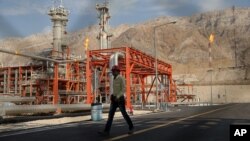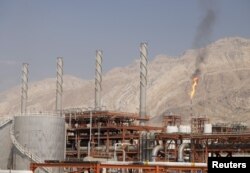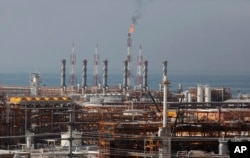South Korean conglomerate Hyundai's cancellation of a major Iran construction project due to problems related to U.S. economic sanctions has been met with silence in Iranian media.
In a brief regulatory filing published Monday, Hyundai Engineering & Construction said it canceled a $521 million contract a day earlier for building a petrochemicals complex in Iran.
"The contract was canceled because financing is not complete, which was a prerequisite for the validity of the contract, as external factors worsened, such as economic sanctions against Iran," Hyundai said.
Twelve hours after Hyundai made the announcement, there were no mentions of it in Iranian state-controlled media. There also was little Farsi-language discussion of the move on Twitter.
The United States is set to reimpose sanctions on Iran's key energy exports on Nov. 4 to try to pressure Tehran into agreeing to a new deal to curb its nuclear and other perceived malign activities. Energy exports are the main sources of revenue for the Iranian government.
For months, international companies in sectors such as energy, aviation, autos and shipping have been withdrawing from or scaling back business with Iran to avoid being hit by secondary U.S. sanctions for continuing such business as the primary U.S. sanctions take effect.
Speaking to the Monday edition of VOA Persian's News at Nine program, Johns Hopkins University applied economics professor Steve Hanke said cancellations of Iranian construction contracts by Hyundai and other foreign companies cause significant delays in the construction process.
"Now, the Iranians have to more or less start over and find somebody new. All of this takes time. As it takes time, the Iranian economy sinks," Hanke said.
Facing growing domestic discontent with Iran's faltering economy, President Hassan Rouhani won parliamentary approval Saturday for a reshuffle of economic posts in his cabinet. He also said Iran can withstand U.S. sanctions by turning to other nations for business.
"Russia, China, India, the European Union and some African and Latin American countries are our friends," he told parliament. "We have to work with them and attract investments."
Hanke said it is more likely that Iran will finance the petrochemical project abandoned by Hyundai with Chinese and Russian partners than with the EU. Washington has put particular pressure on its European allies in recent months not to undermine U.S. sanctions against Iran.
The EU has said it will try to circumvent U.S. sanctions by setting up a "special purpose vehicle" to facilitate transactions between European businesses and Iran. The 28-nation bloc has said it will abide by a 2015 deal between Iran and world powers, curbing Iranian nuclear activities in return for relief from international sanctions. U.S. President Donald Trump withdrew from that deal in May, saying it was not tough enough on Iran. Tehran denies seeking nuclear weapons.
South Korea, a key U.S. ally in East Asia, has not vowed to defy U.S. sanctions, but it does appear to want to salvage its remaining commercial contracts with Iran. South Korean media said Foreign Minister Kang Kyung-wha spoke by phone with U.S. Secretary of State Mike Pompeo on Monday and asked Washington to be flexible in exempting South Korean companies from U.S. penalties for Iran-related business. There was no immediate readout of the phone call from the U.S. State Department.
Hyundai had signed a contract to build a petrochemical complex on Iran's Persian Gulf coast near the southern town of Tonbak in March 2017. South Korean and Iranian media said the contract was for the construction of the second phase of the Kangan Petro Refining Complex in the South Pars Gas Field. The reports valued Hyundai's contract with Iran's Ahdaf Investment Company, an affiliate of a state-run oil firm, at $3 billion.
Hyundai, in its Monday statement, did not explain the discrepancy between the initially reported $3 billion valuation of the contract and its latest $512 million valuation.
This article originated in VOA's Persian Service.






